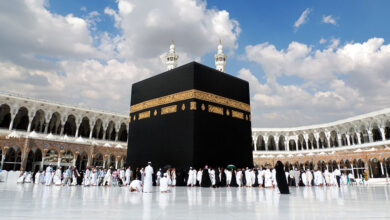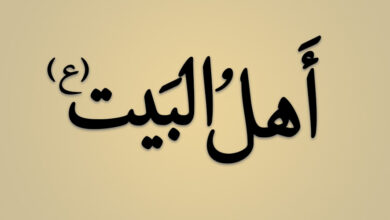
The Concept of Martyrdom in Islam
Islam as an all-inclusive systematic religion is an interrelated set of ideals and realities covering the entire area of human notion and action, beliefs and practices, thought, word, and deed. Islamic principles and concepts cannot be fully and properly appreciated unless they are analysed and realised within the framework of Islam as a whole.
The concept of martyrdom (shahada) in Islam can only be understood in the light of the Islamic concept of Holy Struggle (jihad); and the concept of jihad may only be appreciated if the concept of the doctrine of enjoining right and discovering wrong (al-amr bi’l-maruf) is properly appreciated, and good and bad, right and wrong, can only be understood if the independent divine source of righteousness, truth, and the unity of God (tawhid), and how the Message of the divine source of righteousness and truth has been honestly and properly conveyed to humanity through prophethood, are understood.
Thus, the concept of martyrdom, like all other Islamic concepts, can be fully and wholly appreciated only in the light of the Islamic doctrine of tawhid, or the absolute unity of Allah and full submission to His will and command. It cannot be fully appreciated in isolation.
We should note that there is no martyrdom without struggle in the cause of Allah and for the cause of the truth. Both words have literal meanings different from their terminological meanings, although these terminological meanings were originally based on the literal meanings.
The word shahaada is derived from the Arabic verbal root shahada, which means to ‘see’, to ‘witness’, to ‘testify’, to ‘become a model and paradigm’. Shahaada therefore literally means to ‘see’, to ‘witness’, and to ‘become a model’.
A shahid (martyr) is the person who sees and witnesses, and he is therefore the witness, as if the martyr witnesses and sees the truth physically and thus stands by it firmly, so much so that not only does he testify it verbally, but he is prepared to struggle and fight and give up his life for the truth, and thus to become a martyr. In this way, and by his struggle and sacrifice for the sake of the truth, he becomes a model, a paradigm, and an example for others, worthy of being copied, and worthy of being followed.
We may therefore conclude that there is neither jihad nor martyrdom outside the realm of truth, that martyrdom applies only when it is preceded by jihad, that jihad is an inclusive struggle for the cause of the truth, that a mujahid dies the death of a martyr even though he does not fall on the battlefield. He dies as a martyr even though he is not killed, on the condition that he stays loyal to the divine truth and stands ready to fight for the truth and to defend it at all costs, even at the cost of his own life. He is a mujahid while he lives, and a martyr if he dies or is killed for it.
The true faith is united with righteous living in Islam, and there is unity of belief and practice in Islam. A comprehensive guidance therefore involves leading in thought, words, and behaviour. The guide should therefore practise what he preaches, and should himself be the supreme incarnation and the perfect embodiment of the message he spreads. He should be a paradigm, a model, and a model-maker.
Muhammad was thus the Messenger who brought the comprehensive universal Message of Allah, and he was the incarnation of the divine message, and the living example of his mission, the model (shaahed), the paradigm (uswa). The key word in the concept of prophethood in Islam is thus human guidance. This involves the recognition of what humanity should be guided to, what guidance is, how it should be done, and the realisation of the guidance by being the true model of the actual guidance.
The position of the prophets as the paradigms and model-makers in Islam gives the Islamic concept of prophethood a unique characteristic. Their main responsibility is thus leading and guiding humanity to the truth by being the true incarnation of God. They do not intercede and mediate between the source of the truth and humanity spiritually, in the sense that they come to be crucified to pay for the sins committed by humanity through Adam. In Islam, everybody is responsible for his or her own actions.
Man is thus, originally sinless, good, and peaceful, and the role of the prophets is a positive one that of guidance and of being a paradigm, and not a negative one. Martyrs are the super-models of the divine message, too, and in this way, they share a special responsibility and honour with the prophets.
A model attracts and leads people to the truth. He does not force them. This is in full harmony with the concept of man in Islam. Islam rejects the incarnation in man of the essence of the actual divinity, but fully encourages the incarnation of God’s guidance, will, and command, to become the living example of God’s full code of thought and life (din, religion) for man.
The keyword in Shi’ism is Imamate, which means leading and guiding those in need of guidance. If the community is to be led and guided, the leaders themselves should be the leading examples of the faith in what they try to lead the community to believe in, and models of the code of thought and practice they try to lead others to practice.
That is to say that Shia Imams live a life of continuous struggle in the cause of Allah and of truth, and that is why they are all regarded as martyrs, whether they die on the battlefield or in bed.
The event of Karbala, the martyrdom of the Imam Hussain on “Ashura”, and the whole struggle he undertook, plays a very crucial role in the history of Shi’ism. Yet this unique historical event is seen by the Shi’a as a model event to inspire the Muslims.




